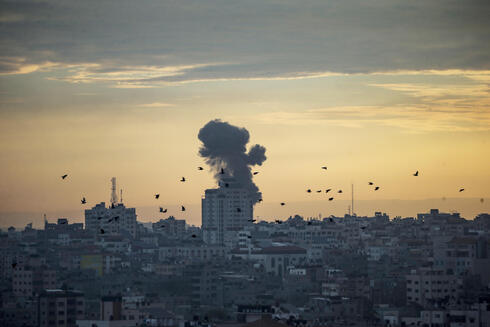
ISRAEL AT WAR
Gaza war could cost global economy $1 trillion
The expansion of the war between Israel and Hamas to multiple fronts, including Iran, could raise the price of oil from $90 to $150 per barrel, push inflation higher, and cut global GDP
The war between Israel and Hamas is far from its end, and not one among us knows how it will unfold or how long it will last. It has already been filled with unimaginable tragedies, both on a personal and collective level. The world's eyes are now focused on the escalating crisis in the region, not only due to the shocking number of casualties and kidnappings but also because of the concern that this war will exact a heavy economic toll on the entire world.
According to an analyst from Bloomberg, if the conflict were to expand into a direct confrontation between Israel and Iran, the price of oil could surge from about $90 to $150 a barrel, potentially cutting global growth by 1.7%, which would equate to a trillion dollar reduction in global GDP.
The Middle East is simultaneously a region rife with conflict, and also one of the most significant global producers of oil and gas. The geopolitical developments in this region, therefore, have immense significance for the global economy, which is profoundly influenced by energy prices.
According to an analysis by Bank Leumi’s chief economist, Gil Bufman, the recent spike in oil prices from $86 to $93 per barrel indicates that the impact of "the war is already being reflected in global energy prices. The spread of the fighting to additional arenas, involving other parties in the Middle East, poses a real risk to energy prices." He adds that if it escalates into a broader conflict involving the U.S. and Iran "this could lead to a reduction of Iran's ability to export oil, whether through legal means or by circumventing sanctions." According to Bufman, such a development "would result in a further decrease in the global supply of crude oil."
Bufman adds that another area of concern is U.S.-Saudi relations "which depend to some extent on progress towards a future peace agreement with Israel. If this process is halted, it may lead to tensions between the U.S. and Saudi Arabia, which may respond by further reducing oil production, which would further damage the global supply. Regional destabilization, including developments regarding the free passage of tankers in the Strait of Hormuz, could also damage the global aggregate supply. The price for Brent crude oil is expected to be around $90-95 by the end of the year."
Related articles:
According to Bufman, the war may also significantly impact natural gas prices. In the U.S. the price per MMBtu - one million British thermal units Million British, the common unit for measuring heat content and natural gas - has crossed the threshold of $3.4. In Europe, there was an even sharper increase when the prices of the TTF, which is a future contract for natural gas, rose from less than 30 to 54 euros per megawatt-hour since last July. Bufman's analysis suggests that "the rapid price increase reflects supply-side shocks. In Europe, there's a significant impact on the underwater pipeline for natural gas. There are suspicions regarding potential sabotage in a 77 km segment between Estonia and Finland, which plays a crucial role in supplying gas to Europe from Norway. For now, it's estimated it will take several months to repair the damage and restore the pipeline."
Bufman also discussed the cessation of gas flow from the Tamar reservoir, the second-largest in Israel, due to the reservoir's close proximity to the Gaza coast and susceptibility to attacks. The reservoir’s largest shareholder is American energy giant, Chevron. Bufman says that "Tamar proactively stopped the flow of gas, leading to the halt of gas to Egypt through the EMG pipeline. This is expected to affect Egypt's export of natural gas to Europe and other countries, although Egypt is not a large exporter so it is negative but not extremely significant. If geopolitical tensions affect Gulf countries like Qatar, which is a major gas exporter, this could have further implications for global gas prices."
‘The most dangerous time in decades’
Bloomberg analyzed three potential scenarios which could have varying impacts on energy prices, global inflation, global growth, and investor activity.
The first scenario, and by far the most optimistic, is a limited and localized war, concentrated in the Gaza Strip. This may include a ground invasion by the IDF into the Gaza Strip, alongside occasional hostilities and military actions on the Lebanon border. In this scenario, Bloomberg predicts that Iran, which has increased its oil production by 700,000 barrels per day this year in return for U.S. sanctions relief, would reduce production to increase global pressure on Israel. Such a scenario would lead to a $4 increase in the price of a barrel of oil, no change in the fear index, VIX, a 0.1% increase in global inflation, and a decrease of a similar amount in global growth.
The second scenario is an indirect war between Israel and Iran, involving a large-scale war on multiple fronts within Israel's borders – Gaza, the West Bank, Syria, and Lebanon – along with overall instability in the Middle East, which would also affect other Arab countries like Egypt and Tunisia. In this scenario, a barrel of oil would jump by $8, and the fear index would increase by 8 points. Inflation would rise by 0.2%, and there would be a 0.3% reduction in global GDP.
The most severe and pessimistic scenario is a direct war between Israel and Iran. While Bloomberg emphasizes the low probability of such a scenario, it also highlights it as the most dangerous. Such a scenario would also involve an all-out regional war, with the direct involvement of the U.S., and all of the Arab states in the region that are economically dependent on Iran, such as Syria and Lebanon.
Such a scenario threatens to destabilize global energy prices and more. This is because Gulf countries are responsible for about 20% of global oil production, and there is a fear that, in this scenario, Iran would close the Strait of Hormuz, through which roughly a fifth of the world's daily oil is transported. If that happened, energy prices would likely not increase fourfold, as they did in response to the Arab oil embargo during the Yom Kippur War in 1973, but a barrel of oil could rise by $64, reaching $150 per barrel.
In this scenario, the fear index would jump by 16 points, inflation would increase by 1.2%, and there would be a 1% decrease in global output. This scenario echoes the concerns of Ray Dalio, the founder of the world's largest hedge fund Bridgewater, that the Israel-Hamas conflict could push the world into World War III. Jamie Dimon, CEO of J.P. Morgan, shared this concern, saying that "this may be the most dangerous time the world has seen in decades."

